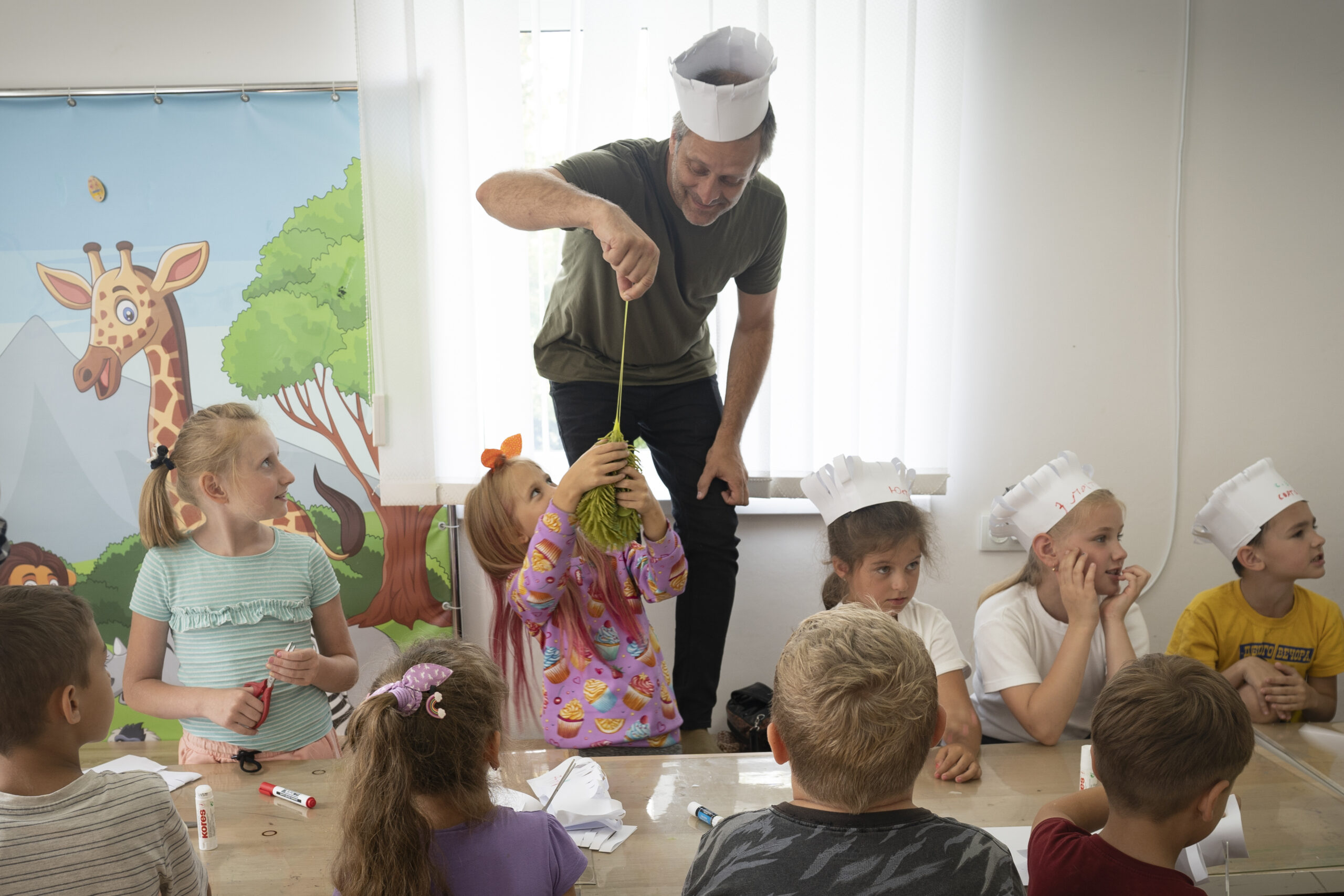DTCare, a Moon-based nonprofit organization, has been delivering humanitarian aid and critical medical supplies to Ukraine and supporting art therapy programs among other endeavors there, all aimed at easing its citizens’ immense suffering as war drags on past two years.
It will expand its efforts this summer with a Ukrainian holistic adventure therapy program for veterans. The goal: support their mental health and foster a community of recovery for veterans, responding to the surge in mental health needs caused by the war.
“The enduring conflict in Ukraine has caused displacement, destroyed livelihoods and damaged essential infrastructure, creating a humanitarian crisis,” a March DTCare brief on the program stated. “Prior to Russia’s full-scale invasion in 2022, suicide was already the leading cause of death in the Ukrainian army, and approximately 30% of Ukrainians experienced a mental health disorder. Attacks on psychiatric facilities and negative stigma have made it difficult for Ukrainian veterans to access mental health support.”
In that document, Ukrainian military therapist Mykhailo Parfonov noted that veterans experienced “a wide range of problems, including physical damage caused by mines and concussion, post-traumatic stress disorder, depression, nightmares and panic attacks.” He explained that veterans are often resistant to psychological help: “They worry about being judged.”
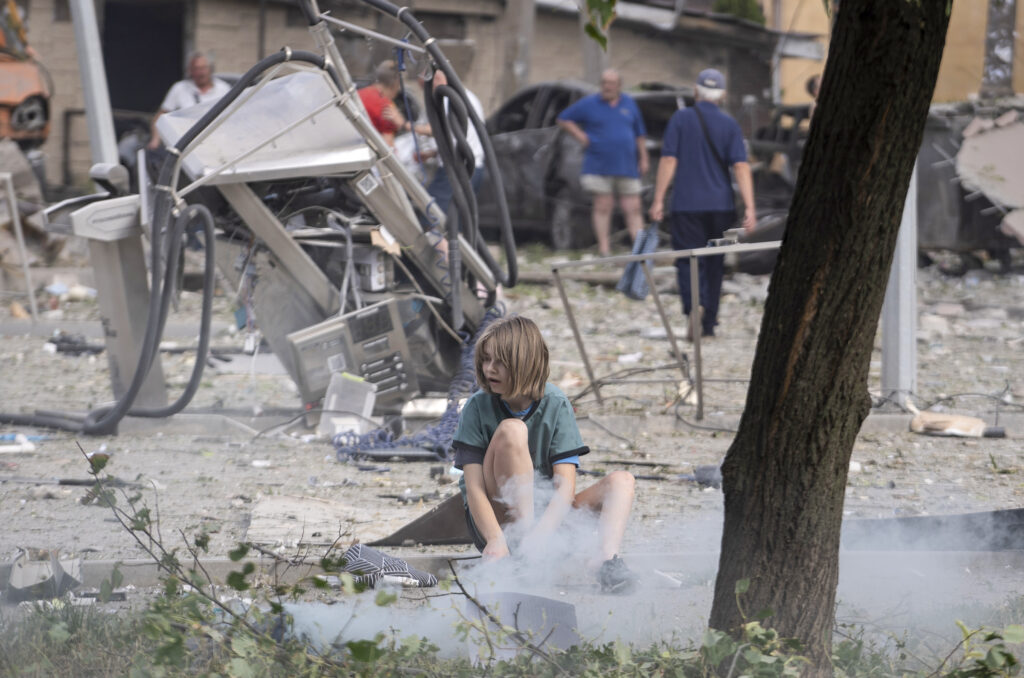
Founded in 2019, DTCare has operations in Lebanon, South Africa, Zimbabwe, Bosnia and Herzegovina, as well as Ukraine, run by a staff of 10 with three in the United States and seven based in those countries supplemented by volunteers.
On its website, DTCare reports it has partnered with multiple organizations in Ukraine and Poland that enable its humanitarian response. In the initial stage of DTCare’s Ukrainian Crisis Relief Campaign, it joined forces with the ZHP (Polish Scouting and Guiding Association) to distribute essential aid to Ukrainian partners. As the crisis escalated, DTCare established a permanent Ukraine office.
“With the help of our partners, donors and volunteers, we sent 23 humanitarian shipments (18 air freight and 5 ocean freight shipments) to Ukraine and Poland in 2022 and 16 humanitarian shipments (6 air freight and 10 ocean freight shipments) to Ukraine in 2023,” the website states. “In total, DTCare has sent close to a million dollars’ worth of over 280,000 pounds of humanitarian supplies to assist Ukrainian citizens.”
It will use that same approach with the veterans program, partnering with a Ukrainian adventure tour organization that has located a Carpathian Mountains lodge for it, one owned and operated by veterans. As noted in DTCare’s March newsletter, “This tranquil environment fosters a safe space for veterans to connect with nature, each other and themselves.”
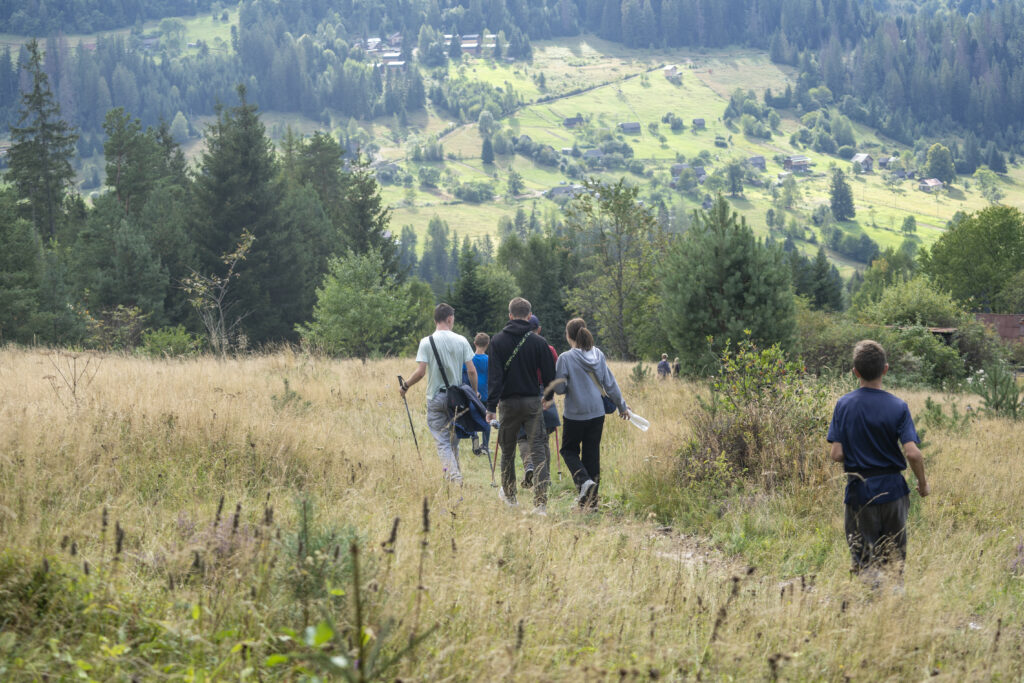
Courtney Robson, DTCare program manager for Ukraine, said the lodge has a skilled team that will support the veterans as they hike, mountain bike, ride horses, experience paddleboard yoga and zip line. Group and individual therapy, art therapy, journaling, and mindfulness and meditation sessions will be part of the eight-day series, led by art therapists, medical staff, physical therapists, addiction counselors, and psychiatric and psychology professionals.
Misha Semonovykh, DTCare operations manager in Ukraine, and Robson toured 20 lodges last month with a long list of questions, including how the lodges would ensure the veterans’ safety, before deciding on a location, which has yet to be announced formally. Robson said she felt as if they had “hit the jackpot” with the one selected.
She and several of DTCare’s Ukrainian staff and partners have work to do yet on the three sessions planned for July, August and September. Hiring the right staff for support is critical, she said.
“It was important to us that they have a veteran mentor. Someone who has experienced war and can talk about the healing process,” Robson explained. The mental health support team will help with that process, including a psychotherapist who has worked with first responders. They are coming close to hiring the needed art therapists.
Semonovykh and Robson will attend a Wounded Warrior training in the U.S., too. They have learned already that for this effort to be successful, the program must bring together veterans who share common experiences, including serving in the same military branch.
The same adventure tour organization organized a three-day summer camp for 30 children last year, which Robson said worked out very well. Oro Whitley, DTCare’s distribution manager in Ukraine, and Maria Boiko, executive director of Care in Action’s Ukrainian sister organization that is a partner in DTCare’s art therapy program, worked on that initiative.
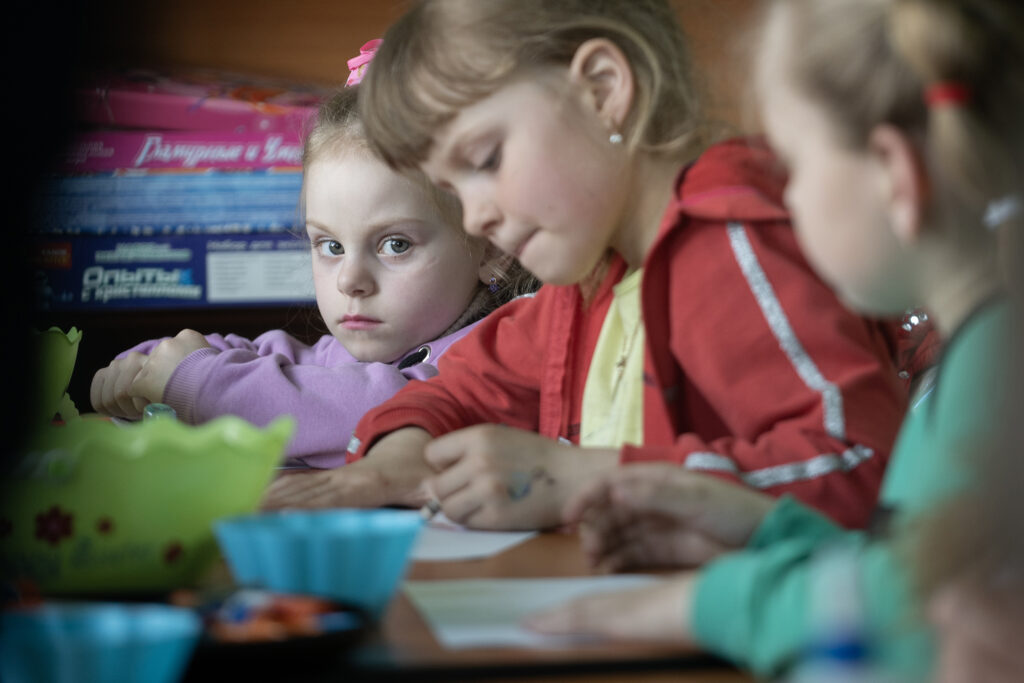
Boiko said 11- to 19-year-olds from vulnerable families and orphanages participated. “They can integrate more when they went out on an overnight trip,” she said. “Some had never been to the mountains, a beautiful part of Ukraine. [A] Cultural, historic component is part of the effort there, too. We went to the highest peak in Ukraine. [So it’s] Also like a nature therapy. … Meeting new friends is also a therapy.”
Another camp last year DTCare supported included parents and children. Held at another resort, Boiko said it was packed with art therapies, handicrafts and life skills workshops for teens and other training for parents.
Robson said those past efforts are helping them finalize the veterans program, too. They’re working on intake forms and sharing information with the Ukrainian veterans groups and rehabilitation partners. The 10 veterans selected for each session will not pay anything; DTCare is funding this initial effort.
DTCare staff will collect data and feedback when it concludes and will share information with potential funders and partners. “The idea is the plan will be excellent and well run and supported internationally by different veterans groups,” Robson said. “We hope this will be a program we can share with others so they could sponsor it. Our hope is that it spreads.”
The nonprofit has already seen that happen with its art therapy program. Since January, with partners like Care in Action, it conducted 381 sessions across Ovruch, Mykolaiv, Ternopil, Kyiv, Lviv, Odesa and Dnipro, totaling 531 hours of free community art therapy programming. Robson said each session typically has between five and 10 individuals, from young children to adults, but some groups can be larger. It also leads individual sessions, too, traveling to rural areas where transportation options are scarce.
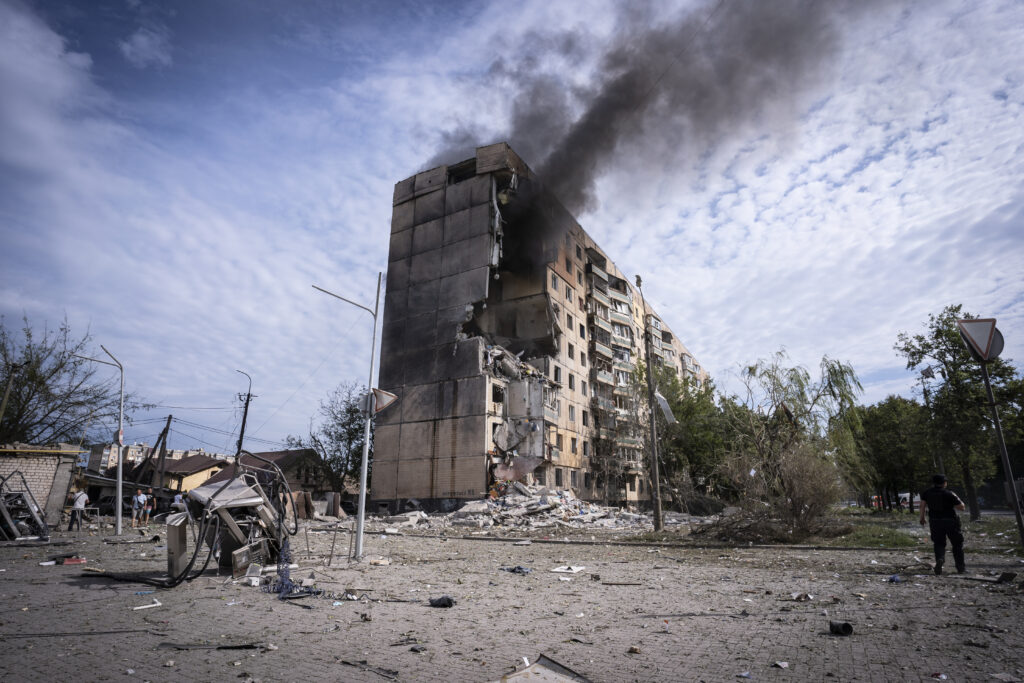
Robson returned in late March from a 17-day trip to mostly western Ukraine, visiting DTCare’s programs in Ternopil, Ovruch, Kyiv, Chudniv.
In a Zoom interview, Boiko, Whitley and Vasylana Beniakh, who works with a DTCare team based in Mykolaiv, explained what DTCare’s art therapy and other aid supplied means to their country.
Boiko noted that in partnership with DTCare, her organization has supported 14 locations that provide art and some music therapy for displaced children and families in “difficult life situations,” a now oft-repeated Ukrainian phrase. This year it has engaged 10 more, and she believes that number will increase. In the first quarter, she said 200 children in Lviv have participated. Libraries, hospitals and clinics, and camps serve as settings for some of the sessions; art therapists also travel to locations that provide shelter for displaced children and adults, as well homes, as children are being housed in family-style situations, too, similar to the U.S.’s foster care network. Robson said DTCare now funds 27 therapists across Ukraine. In April, Boiko joined the DTCare team as a part-time projects manager.
Whitley, who grew up in Idaho and Montana and lived in Seattle after graduating from art school there, has been in Ukraine for two years, working with different organizations. An artist and a professional photographer since 2011, the 48-year-old is also working on a documentary about the Russian invasion. He connected with DTCare because it supported the various organizations he worked with and met Boiko.
His dedication to the effort is personal, too. “Artwork has also been a help to me in dealing with my personal traumas,” he said.
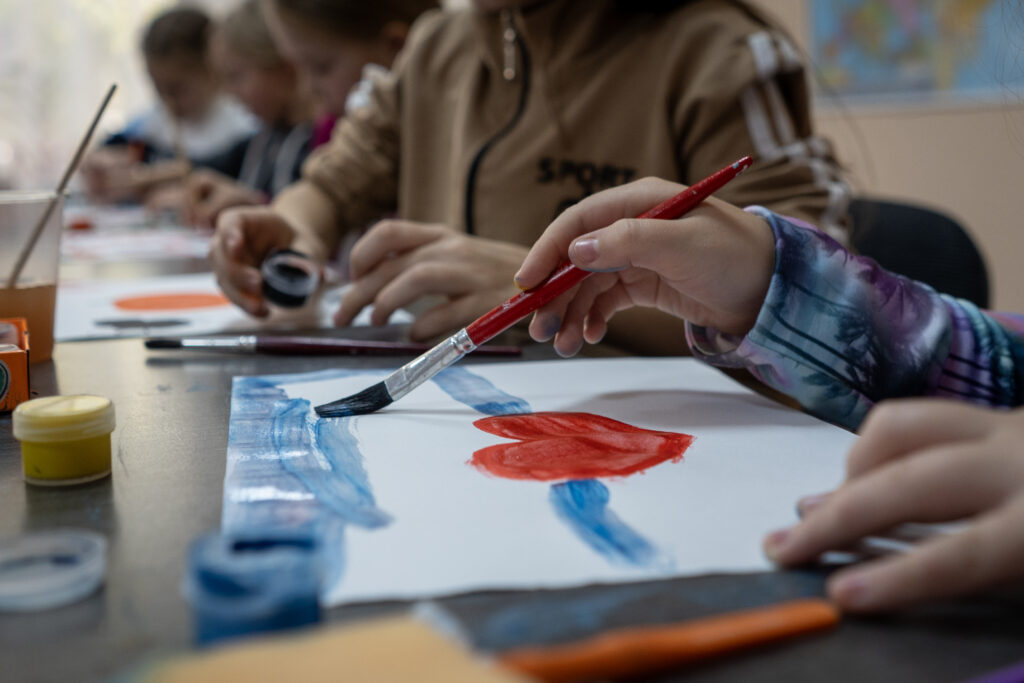
With Beniakh’s help, Whitley said they are trying to reach more people. “We send our therapists to different communities. [Beniakh’s] been going out with the therapists. … We’re branching out even more. Kherson, that’s a difficult area, but it may be a possibility.”
During Robson’s visits, she listens as well as observes, delighted that she was invited to have tea in an Ovruch home, providing her with additional insight. What she hears constantly is the need for mental health care.
“Whether it is working on agriculture programs or setting up a safe program, helping towns rebuild or [starting a] mental health program or children’s program in Lviv, we work hard to figure out what people need and support them as best as we can. … The need we are offering is important and useful, and people are open to receiving it.”
Boiko said the help is needed because although Ukrainians are brave, “We are really scared. We live in constant stress.”
The 31-year-old who majored in English in college but moved into a social work career said she and her friends find it difficult to have experiences that bring joy and happiness to their lives. She can’t plan ahead five to 10 years. “The enemy is very strong. This should not be allowed,” she said. “Any help is needed. We would not be able to go on without that help. It’s a question of global justice. Good people should stand with Ukraine. [That message] should be repeated so the spark for help is there and doesn’t fade away.
Beniakh, who is 24, had to finish her last college semester in Slovakia because of the war. She returned last year to volunteer as a translator in the Donetsk region and met Whitley at a memorial service for the NGO leader she worked for in September. An art major who worked extensively in glass, she became intrigued with how art can work with psychology and help her people.
“The only thing that scares me a lot is that violence has become our everyday norm,” Beniakh said. “I couldn’t even imagine this to happen a few years ago. That we would live with war every day. Be guilty for [experiencing] joy or happiness. For me, I have more questions every day and for a lot of people that we know.”
One bright spot is that Boiko and Whitley will travel to Pittsburgh in October to help DTCare present a session, “Building Bridges of Healing: Art Therapy Informed Crisis Care in Ukraine,” at the national American Art Therapy Association conference.
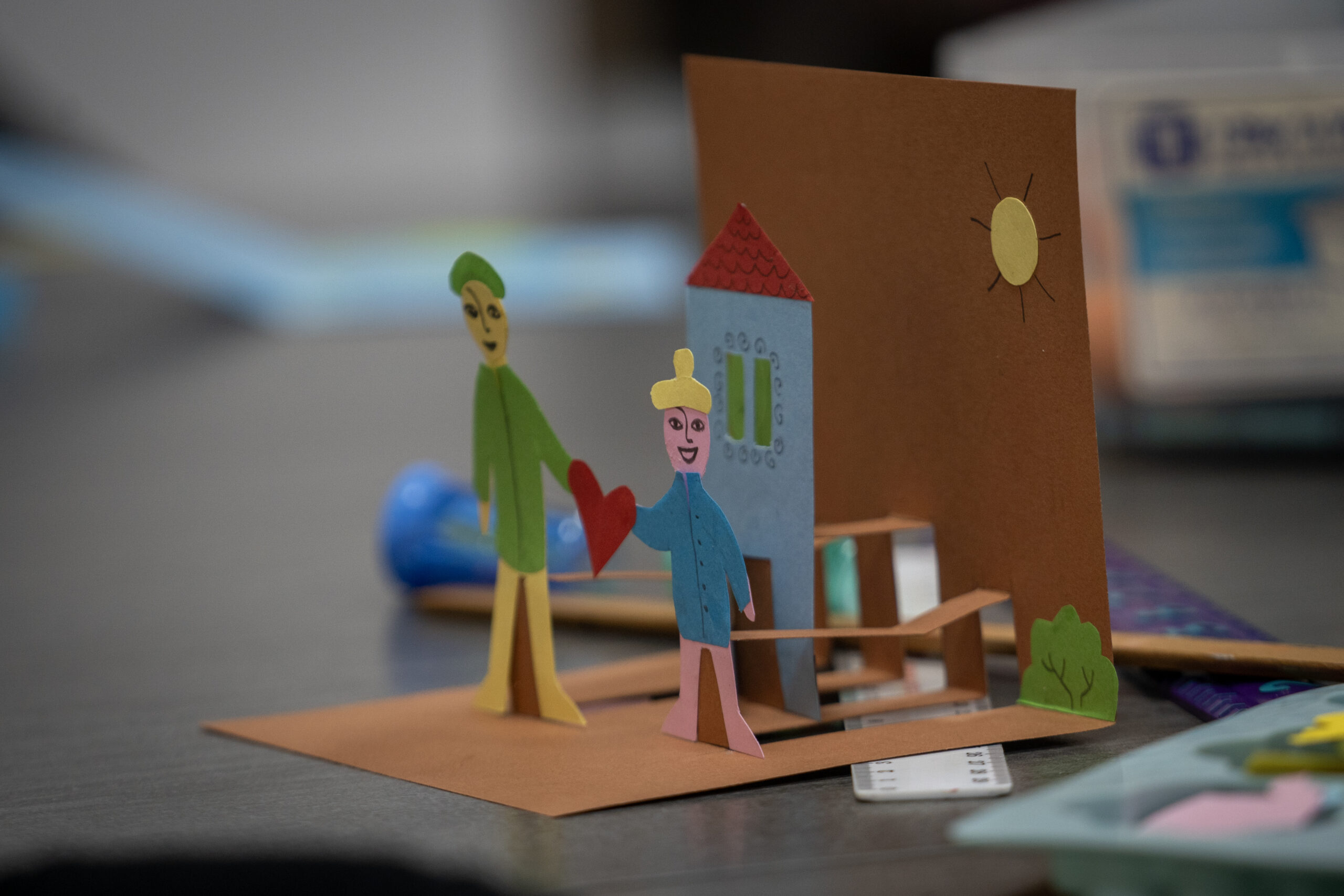
Whitley said the Ukrainian people have become his chosen family. “Brave, clever, ingenuity would be the way I would describe the vibe here,” he said. “They’re very proud to be Ukrainian.
“The bravery here is what keeps me going. People are hard working. I’ve seen entire communities that have been decimated and leveled to the ground. In every one of those communities, there I’ll find one old woman who is rebuilding on her own, reclaiming what was lost, starting a garden or moving bricks one by one. Ultimately, I am inspired by the strength and the resilience of the people here.”
To donate to DTCare or volunteer to assist its efforts, go to https://www.dtcare.org/donate.
Helen is a copy editor at the Pittsburgh Post-Gazette, but she's currently on strike. Contact her at hfallon@unionprogress.com.

